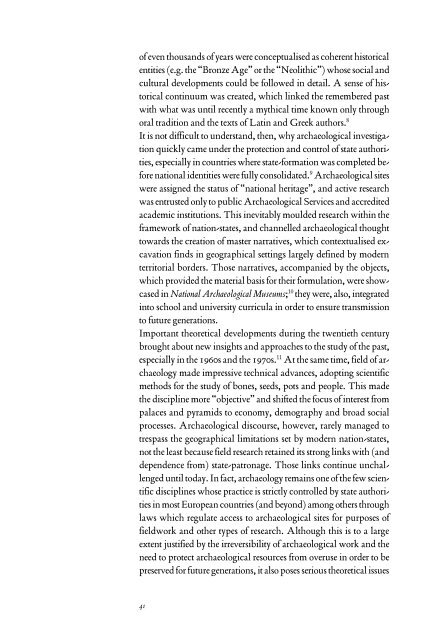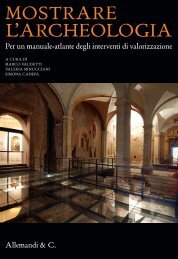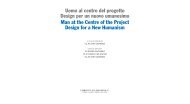Download ebook FREE - Allemandi
Download ebook FREE - Allemandi
Download ebook FREE - Allemandi
Create successful ePaper yourself
Turn your PDF publications into a flip-book with our unique Google optimized e-Paper software.
of even thousands of years were conceptualised as coherent historical<br />
entities (e.g. the “Bronze Age” or the “Neolithic”) whose social and<br />
cultural developments could be followed in detail. A sense of historical<br />
continuum was created, which linked the remembered past<br />
with what was until recently a mythical time known only through<br />
oral tradition and the texts of Latin and Greek authors. 8<br />
It is not difficult to understand, then, why archaeological investigation<br />
quickly came under the protection and control of state authorities,<br />
especially in countries where state-formation was completed before<br />
national identities were fully consolidated. 9 Archaeological sites<br />
were assigned the status of “national heritage”, and active research<br />
was entrusted only to public Archaeological Services and accredited<br />
academic institutions. This inevitably moulded research within the<br />
framework of nation-states, and channelled archaeological thought<br />
towards the creation of master narratives, which contextualised excavation<br />
finds in geographical settings largely defined by modern<br />
territorial borders. Those narratives, accompanied by the objects,<br />
which provided the material basis for their formulation, were showcased<br />
in National Archaeological Museums; 10 they were, also, integrated<br />
into school and university curricula in order to ensure transmission<br />
to future generations.<br />
Important theoretical developments during the twentieth century<br />
brought about new insights and approaches to the study of the past,<br />
especially in the 1960s and the 1970s. 11 At the same time, field of archaeology<br />
made impressive technical advances, adopting scientific<br />
methods for the study of bones, seeds, pots and people. This made<br />
the discipline more “objective” and shifted the focus of interest from<br />
palaces and pyramids to economy, demography and broad social<br />
processes. Archaeological discourse, however, rarely managed to<br />
trespass the geographical limitations set by modern nation-states,<br />
not the least because field research retained its strong links with (and<br />
dependence from) state-patronage. Those links continue unchallenged<br />
until today. In fact, archaeology remains one of the few scientific<br />
disciplines whose practice is strictly controlled by state authorities<br />
in most European countries (and beyond) among others through<br />
laws which regulate access to archaeological sites for purposes of<br />
fieldwork and other types of research. Although this is to a large<br />
extent justified by the irreversibility of archaeological work and the<br />
need to protect archaeological resources from overuse in order to be<br />
preserved for future generations, it also poses serious theoretical issues<br />
41







